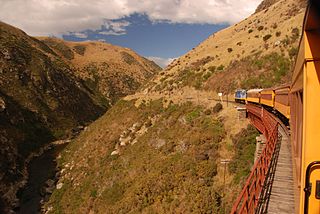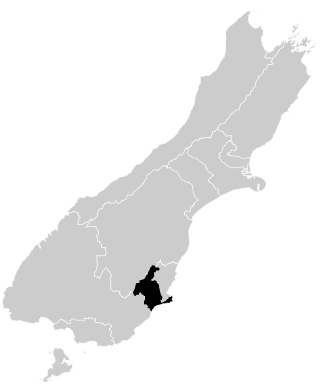Related Research Articles

Otago is a region of New Zealand located in the southern half of the South Island administered by the Otago Regional Council. It has an area of approximately 32,000 square kilometres (12,000 sq mi), making it the country's second largest local government region. Its population was 254,600 in June 2023.

Dunedin is the second-largest city in the South Island of New Zealand, and the principal city of the Otago region. Its name comes from Dùn Èideann, the Scottish Gaelic name for Edinburgh, the capital of Scotland. The city has a rich Māori, Scottish, and Chinese heritage.
William Henry Cutten was a New Zealand politician from the Otago region.

Dunedin Railways is the trading name of Dunedin Railways Limited, an operator of a railway line and tourist trains based at Dunedin Railway Station in the South Island of New Zealand. The company is a council-controlled trading organisation wholly owned by Dunedin City Council through its holding company Dunedin City Holdings Limited.

Dunedin South is a former New Zealand parliamentary electorate. It first existed from 1881 to 1890, and subsequently from 1905 to 1946. In 1996, the electorate was re-established for the introduction of MMP, before being abolished in 2020.
Peninsula was an Otago electorate in the New Zealand Parliament from 1881 to 1893, based on the Otago Peninsula.

Roslyn is a major residential and retail suburb of the New Zealand city of Dunedin. It is located 150 metres (490 ft) above the city centre on the ridge which runs in a crescent around the central city's western edge. It is 2.5 kilometres (1.6 mi) to the northwest of the city centre, immediately above the Town Belt.
Bruce was a rural parliamentary electorate in the Otago region of New Zealand, from 1861 to 1922. For part of the 1860s with the influx to Otago of gold-miners it was a multi-member constituency with two members.
Taieri is a parliamentary electorate in the Otago region of New Zealand, initially from 1866 to 1911, and was later recreated during the 2019/20 electoral redistribution ahead of the 2020 election.
Waikouaiti was a parliamentary electorate in the Otago region of New Zealand, from 1866 to 1908.
The Gold Fields District electorate was a 19th-century parliamentary electorate in the Otago region, New Zealand. It was created in 1862, with the first elections in the following year, and it returned two members. It was one of eventually three special interest constituencies created to meet the needs of gold miners. All three of these electorates were abolished in 1870. A unique feature of the Gold Fields District was that it was superimposed over other electorates, and voting was open to those who had held a mining license for some time. As such, suffrage was more relaxed than elsewhere in New Zealand, as voting was otherwise tied to property ownership. Another feature unique to the gold mining electorates was that no electoral rolls were prepared, but voting could be done upon showing a complying miner's license.
City of Dunedin, during the first two parliaments called Town of Dunedin, was a parliamentary electorate in Dunedin in Otago, New Zealand. It was one of the original electorates created in 1853 and existed, with two breaks, until 1905. The first break, from 1862 to 1866, was caused by an influx of people through the Otago Gold Rush, when many new electorates were formed in Otago. The second break occurred from 1881 to 1890. It was the only New Zealand electorate that was created as a single-member, two-member and three member electorate.
Roslyn was a parliamentary electorate in the city of Dunedin in the Otago region of New Zealand from 1866 to 1890.
The 4th New Zealand Parliament was a term of the Parliament of New Zealand.
Donald Reid was a Scottish-born 19th-century farmer, landowner, and businessman in Otago, New Zealand. A member of the Otago Provincial Council he was later a Member of Parliament for ten years between 1866 and 1878.
William Archibald Murray was a 19th-century Member of Parliament in Otago, New Zealand. During his time in parliament, he moved to the Waikato.
The Bruce by-election 1862 was a by-election held in the multi-member Bruce electorate during the 3rd New Zealand Parliament, on 31 July 1862. The by-election was caused by the death of incumbent MP Charles Kettle on 5 June, and was won by Edward Cargill.
The April 1865 Bruce by-election was a New Zealand by-election held in the multi-member electorate of Bruce during the 3rd New Zealand Parliament on 8 April 1865. It was triggered on 9 January that year by the resignation of separationist Thomas Gillies and won by prominent settler Arthur John Burns. The more liberal businessman William John Dyer was the sole other contester of the by-election, finishing with 43.33% of the vote.
The 1878 Taieri by-election was a by-election held on 11 July 1878 during the 6th New Zealand Parliament in the electorate of Taieri in Otago.

Ingrid Marieke Leary is a New Zealand politician. In 2020 she was elected as a Member of Parliament in the House of Representatives for the Labour Party.
References
- 1 2 "The Taieri Election". Otago Daily Times . No. 2302. 22 June 1869. p. 2. Retrieved 9 January 2019.
- ↑ "The Taieri Election". Otago Daily Times . No. 2295. 14 June 1869. p. 2. Retrieved 9 January 2019.
- ↑ "Tokomairiro, June 16, 1869". The Bruce Herald. Vol. VI, no. 628. 16 June 1869. p. 4. Retrieved 9 January 2019.